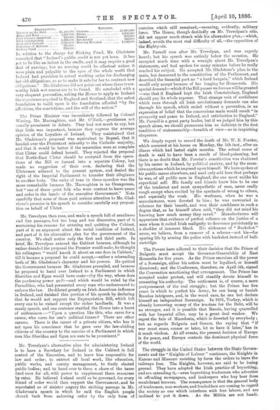Mr. Parnell rose after Mr. Trevelyan, and was eagerly heard
; but his speech was entirely below the occasion. He occupied much time with a wrangle about Mr. Trevelyan's statements, and had spoken for many minutes before he really reached his subject. He accepted Mr. Gladstone's plan in the main, but demurred to the constitution of the Parliament, and described the financial part as "a hard bargain," which Ireland would only accept because of her longing for Home-rule. His special demand—which if the Bill passes we foresee will be granted —was that if England kept the Irish Constabulary, England should pay its whole expense. That strange vein of sordidness which runs through all Irish revolutionary demands ran also through his speech, which ended without a peroration, in an expression of belief that the concessions made would result " in prosperity and peace to Ireland, and satisfaction to England." Mr. Parnell is a great party leader, but if we judged him by this speech alone, we should pronounce him as deficient in the first condition of statesmanship—breadth of view—as in inspiriting eloquence.


































 Previous page
Previous page